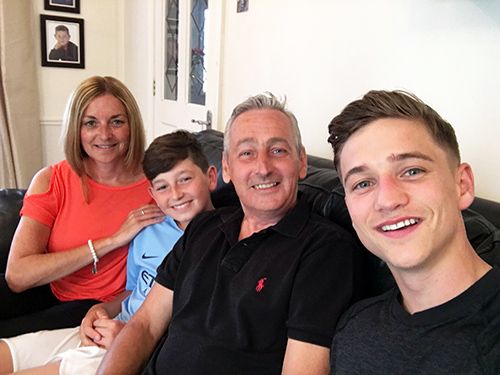
Pictured: Stepen Spence with wife Kate and sons Jack and Josh
A dad who suffered 50 cardiac arrests during the space of 10 days today spoke of his overwhelming gratitude to the medical teams who saved his life.
Stephen Spence, 52, from Burnley, was suddenly struck by a cardiac arrest while sleeping and says he owes his life to the prompt treatment and dedicated care he received at Royal Blackburn Teaching Hospital (RBTH).
He went on to suffer another 50 cardiac arrests while in hospital but has now made an amazing recovery and been fitted with an internal heart defibrillator.
It was wife Kate who first realised something wasn’t right when she was woken up by Stephen’s snoring.
Kate, 43 explains: “Stephen is known for his snoring and normally I just nudge him and he turns over and stops snoring.
“On this particular occasion, what I thought was Stephen’s snoring woke me up at about 5.30am so I nudged him, but he did not respond.
“I nudged him three or four times but he did not respond. I started shaking him hard to wake him and realised his body was limp.
“I switched the light on and realised Stephen was basically dead. It was terrifying. I later discovered that what I thought was snoring was actually him trying to breathe as he was having his heart attack at the time.”
A distraught Kate screamed for eldest son Josh, 22 and they called 999 and Josh was given instructions on performing CPR on his dad until paramedics arrived.
Stephen was taken by NHS ambulance to RBTH where doctors confirmed he had suffered a cardiac arrest and was in a critical condition.
Stephen was later taken to the Cardiac Catheter Lab where consultant Scot Garg unblocked two of his main arteries with stents and transferred him to critical care.
Stephen’s cardiac arrest occurred on December 9 last year and during the next 10 days he suffered another 50 cardiac arrests and each time, he needed shocks to get his heart going again.
Kate explains: “Stephen was intubated and when they tried to take him off life support, he would come round but then get agitated and have another cardiac arrest.
“It was all so frightening as it was so sudden. Before that, Stephen had been healthy and well and there were no signs of heart problems.
“Within those 10 days, Stephen suffered all sorts of other complications because of the cardiac arrests.
“Doctors did a scan and found he was suffering from hypoxic brain injury because of the lack of oxygen to the brain. They were concerned about brain damage when he woke up and I was told to prepare for the worst.”
Stephen was in intensive care all over Christmas but after turning a corner and becoming stable, he was moved to coronary care and improved day-by-day.
Towards the end of January this year, he went to Wythenshawe Hospital in Manchester where he had a mini defibrillator fitted on his heart.
Stephen is now home and rehabilitating, building his strength back up.
Kate says: “When Stephen first came home, he was very weak and had lost a lot of weight and gone down to eight-and-a-half stones.
“But he is now absolutely fine and having regular check-ups. He is also undergoing cardiac rehabilitation at Burnley Hospital.
“Stephen had a heart scan and it showed his heart had significantly improved. That, together with having the defibrillator fitted, has given us peace of mind.”
The couple have praised the hospital staff who cared for Stephen and nursed him back to health and say they went over and beyond in their dedication.
“The Critical Care staff were outstanding,” says Kate. “Some of the nurses wouldn’t even go for their lunch break as they didn’t want to leave Stephen.
“If it wasn’t for all the staff being so caring and supportive, we wouldn’t have got through it.”
Stephen, an operations manager at a security firm, has just returned to work and says his recovery has been so great, he feels better than he did before going into hospital.
His recollections of what happened are hazy, particularly his time in Critical Care. But what does stand out in his mind is the unwavering care of the NHS staff who looked after him.
Stephen says: “To me, it is as if it all happened to someone else as I was not there.
“I have been up to Critical Care and spoken to some of the staff and the matron joked with me that I was like a training aid for the staff as I needed so many shocks!
“I had absolutely fantastic care. Nursing and medicine is a vocation and I have a lot of time and respect for anyone within that profession.
“The doctors and nurses who looked after me gave it their all and were brilliant. I can never repay them for what they did for me. They are lifesavers.”
Stephen now encourages people not to dismiss anything unusual as he says a couple of weeks before his cardiac arrests, he thought he had indigestion.
He says: “I thought it was just heartburn or indigestion. Maybe if I’d gone to the doctors at that stage, things might not have got as serious as they did.
“I feel great now and even better than I did before I went into hospital.”
Kate adds: “We are just glad Steve has made such a wonderful recovery and lived to tell the tale.”
Dr Ravi Singh, cardiac consultant said: “I think it is remarkable that Stephen has made such a great recovery and we all need stories like Stephen’s to motivate ourselves and remind ourselves that what we do at the trust is life changing, not just for the patient, but also their family.
“Stephen has been to visit the units where he was cared for and it has been uplifting for staff to see such a happy ending.”


